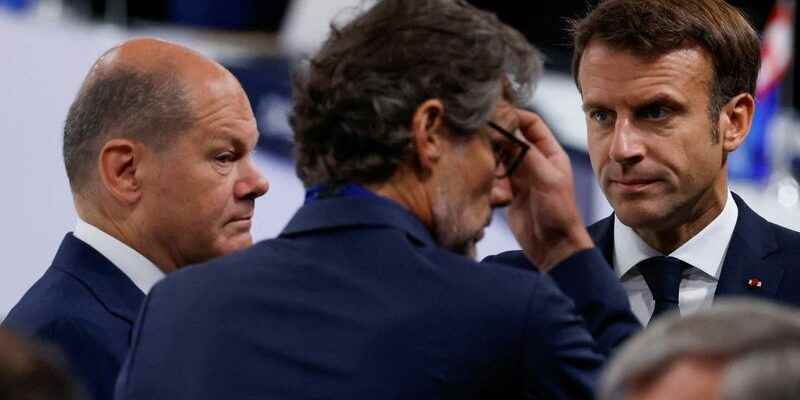by Andreas Rinke, Belén Carreño and Michel Rose
BERLIN/MADRID/PARIS (Reuters) – The explanations given by Emmanuel Macron to justify his opposition to the gas pipeline project between France and Spain do not seem to have convinced in Madrid or Berlin, where the French president is suspected of favoring the interests of Paris to the detriment of the European common good.
Germany and Spain are urging France to give the green light to the relaunch of this trans-Pyrenees project which would allow the distribution to northern Europe of Algerian gas or LNG (liquefied natural gas) transiting through Spain, to reduce dependence on Russian imports.
Launched in 2013, the MidCat project (Midi-Catalonia), which was to link a city north of Barcelona to Barbaira, in Aude, was suspended in 2019, deemed too expensive and damaging to the environment.
A week ago, at a press conference at the Elysée Palace following a videoconference interview with German Social Democratic Chancellor Olaf Scholz, Emmanuel Macron said he was unconvinced by the need for new gas interconnections, explaining that the current flows between France and Spain were not saturated and that the construction of the gas pipeline would take too long to solve the current energy crisis.
But the German and Spanish governments remain skeptical. They suspect France of seeking to protect its ailing nuclear sector and of wanting to avoid competition from Spain, which aims to become a major supplier of natural gas thanks to major port infrastructure capable of receiving LNG.
“Macron is under pressure from several groups who do not like this gas pipeline project – the most important being undoubtedly the nuclear industry sector,” a senior German official told Reuters.
The French Ministry of Energy Transition and the EDF group declined to comment.
Olaf Scholz, who raised the issue during his interview with Emmanuel Macron, said in August that the MidCat gas pipeline was “seriously lacking” in the current context of the energy crisis.
In Madrid, the opposition expressed by the French head of state occupied a good part of the discussions in the Council of Ministers last week, according to a government source. The government of Pedro Sanchez says it is ready to demonstrate the rationality of the project, as proposed by Emmanuel Macron.
But from the same source, it is estimated that France must in turn demonstrate how it shows solidarity with the rest of Europe, while more than half of its nuclear reactors are shut down for maintenance or problems. corrosion.
“WE WANT TO GET OUT OF THE GAS”
On the French side, it is argued that the project was rejected by French and Spanish regulatory authorities three years ago. At the time, the French Energy Regulatory Commission (CRE) noted that according to independent studies, the positive economic benefits linked to the project were located “exclusively” in the Iberian Peninsula.
Madrid has built many LNG terminals – too many, according to industry experts – and the pipeline to France would be a perfect outlet to export its gas to northern Europe.
But France also covets this position as the main platform for Western Europe for the distribution of LNG imports from North America or elsewhere. It already has terminals in Brittany and Dunkirk which will transport gas across the Rhine, after some technical adjustments.
France also stresses that the project raises questions on the environmental level and that the overall objective is to reduce dependence on gas, and not to increase it, by relying on an energy mix centered on energy sources decarbonized such as nuclear or renewables.
“France is not closed to re-examining this dossier, but with more skepticism than the others. The thing that bothers us is that we want to get out of the gas and we don’t want to recreate dependence on other countries,” a French government source told Reuters.
Both Germany and Spain argue that the gas pipeline could also be used to transport hydrogen, another green solution to fossil fuels. The German government points out that it could thus transport hydrogen imported from Canada or North Africa.
To this, France says it prefers the local production of hydrogen.
A PLAN B TO ITALY
Faced with the opposition clearly expressed by Emmanuel Macron, Berlin and Madrid are now examining alternative options. “If you can’t work with the man, go around it,” summarizes a German official.
A plan B would be to build an undersea gas pipeline between Spain and Italy, German and Spanish government sources say.
“Building a gas pipeline is not the most expensive part – if the markets think it is profitable, they will finance it,” says an official in Berlin. “And maybe if France fears being left out, it will change its mind.”
The Spanish government is actively working on a feasibility study for an undersea conduit linking Barcelona to Livorno, on the Tuscan coast, which already has the backing of the Italian government, an official in Madrid said.
A representative of the autonomous region of Catalonia, however, believes that such a pipeline would not be the ideal solution, as it could not transport hydrogen.
In Madrid, where the president of the socialist government Pedro Sanchez does not hesitate to use his relations with his social democratic counterpart Olaf Scholz to put pressure on Emmanuel Macron, the question is to know what type of counterpart could be offered to the head of the French State to review its position.
(French version Jean-Stéphane Brosse, edited by Tangi Salaün and Sophie Louet)
Copyright © 2022 Thomson Reuters
